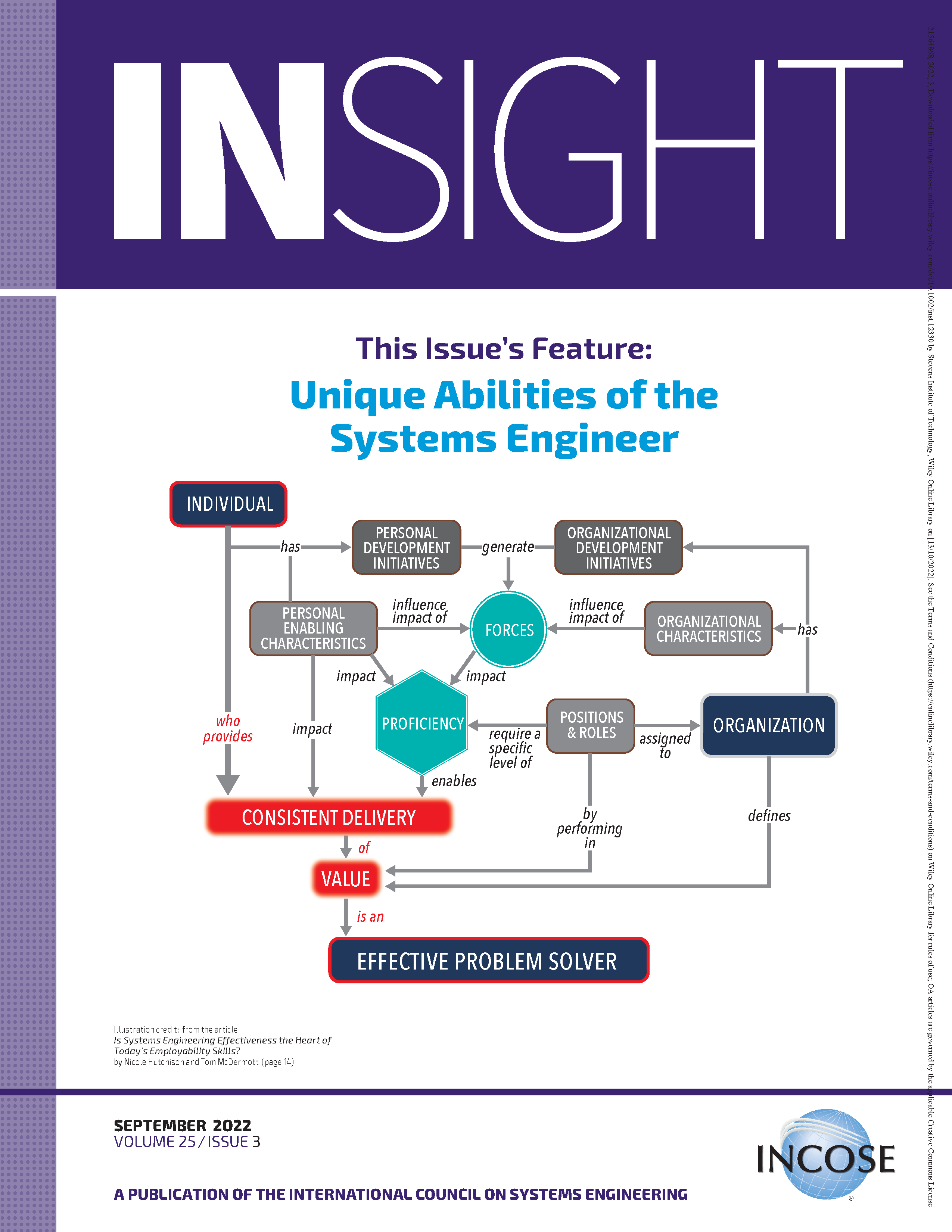SERC Researchers Guest Edit September’s Special Issue of INCOSE INSIGHT

The International Council on Systems Engineering (INCOSE) published the latest issue of INSIGHT, the society’s practitioner’s magazine, on Oct 1. INSIGHT periodically creates special issues around a theme that is highly relevant to the systems engineering community. This special issue was focused on the unique abilities of systems engineers, and SERC Researchers Tom McDermott and Nicole Hutchison served as the guest editors. The articles describe how systems engineers inform a world that needs skills in leadership, systems thinking, innovation, and design. Overall, the issue gives insight into how the knowledge, skills, and abilities of systems engineers can be applied within the discipline and generalized to apply outside of it and highlights how many current and future workforce strategies can be addressed through system skills.
The articles contained in the issue include:
- “The Unique Abilities of the Systems Engineer” by Tom McDermott and Nicole Hutchison. This article introduces the theme of the issue and discusses why the workforce focus is particularly relevant at this time: as systems engineering evolves to focus more on the role of data, models, and simulation and must deal with technologies such as artificial intelligence and machine learning, the skills systems engineers require to be effective must also evolve.
- “Is Systems Engineering Effectiveness the Heart of Today’s Employability Skills?” by Nicole Hutchison and Tom McDermott. This article extends the result of the SERC Helix study, a multi-year research study targeted at identifying the critical proficiencies of systems engineers. The work highlighted a significant correlation between Helix results and prevailing frameworks for employability skills – general skills that are necessary for success in the labor market at all employment levels and in all sectors that easily transfer from job to job. (Learn more about the Helix project at www.helix-se.org.)
- “Using the INCOSE Systems Engineering Competency Framework” by Clifford Whitcomb, Corina White, and Rabia Khan. This article discusses INCOSE’s Systems Engineering Competency Framework (SECF) and the recently published Systems Engineering Assessment Guide (SECAG). The article illustrates four scenarios for using the framework, highlighting how organizations can use the framework to improve systems engineering value. (To view the INCOSE Competency Framework, click here.)
- “A Vision for Universal and Standardized Access to Systems Competency Education” by Caitlyn A.K. Singam. This article describes INCOSE’s SysSTEAM (Systems, Science, Technology, Engineering, Arts, and Mathematics) initiative, which focused on adding systems thinking and other systems competencies into STEAM initiatives. (To learn more about the SysSTEAM initiative, click here.)
- “The Digital Engineering Competency Framework (DECF): Critical Skillsets to Support Digital Transformation” by Nicole Hutchison and Hoong Yan See Tao. This article describes the digital transformation being experienced throughout the systems engineering community through the lens of the US Department of Defense. In this context, the article describes the SERC’s work to develop a competency framework for digital engineering, which combines systems engineering principles with the data, modeling, and simulation principles required to enable systems engineering in a fully digital way. (To view the DECF, click here.)
- “For the Journey to Expertise in Systems Engineering, Enhance the Path with Shu Ha Ri” by Fred Y. Robinson. Shu Ha Ri represents three phases of mastery pursuit, rooted in a triplet of ancient Japanese constructs: Shu to learn the basics, Ha to learn tools, and Ri to extend beyond just using the tools and demonstrating skills. Robinson notes that systems engineers, as expert practitioners who address wicked problems, have characteristics that both build upon and depart from their foundational learning, rather than the deliberate honing of deeper learning found in disciplines more focused on simplistic problems.
- “What Is the Role of a Systems Engineer in an Engineering Organization?” by Richard Beasley. This article discusses the long-term objective of making systems engineering “the way we do engineering” and provides insights from the author’s organization on how it tackled these challenges.
- “Systems Skills … From Here to Diversity” by Alan Harding. Systems engineers enable the development and sustainment of successful systems, working effectively across disciplines, and engaging widely with stakeholders. This article describes how the abilities of systems engineers should contribute to diversity, equity, and inclusion.
- “Systems Engineers – Value Added Product Owners” by Aswin Sukumaran Nair. In agile development, product managers and product owners function as the bridge between the business and stakeholders and the product delivery teams. Nair describes why systems engineers make excellent product managers and product owners in agile product/service development and delivery.
- “Why Mountain Bike Trails Try to Scare You Off” by Courtney Wright. This article goes far from the commonly discussed domains and products of systems engineering and looks at how a person might improve how they lead a bike ride by using systems engineering principles. Wright also discusses the potential implications of applying systems concepts in unusual ways for INCOSE’s Certified Systems Engineering Professional (CSEP) program.
- “Teaching Systems Engineering Practices Using Principles from Studio Art Education” by Tom McDermott and Molly Nadolski. The authors discuss a cross-disciplinary learning program that incorporates studio art, systems thinking, and systems architecture to improve systems competencies in any individual. The art studio format encourages students to build their skills across a portfolio of work focused on the creation of appropriate views of a system, communicating those views, and gaining critical review – three core aspects of the systems thinking process applicable to any discipline.
This diverse collection of articles provides a holistic perspective – one might say a system’s view – on the flavors of systems engineering being practiced today and the expected trends into the future.
This issue of INSIGHT also includes a cautionary open letter to fellow systems engineers by INCOSE Fellow and SERC Researcher Michael Pennotti titled, “Blinded by the Light?” Pennotti discusses the two fatal aircraft crashes that took the lives of 346 passengers and crew in October 2018 and March 2019. Pennotti rhetorically asks how is it that systems engineers armed with our formal processes, digital engineering, agile methods, sophisticated models, and even our own modeling language could have missed the design fault in the aircraft?

